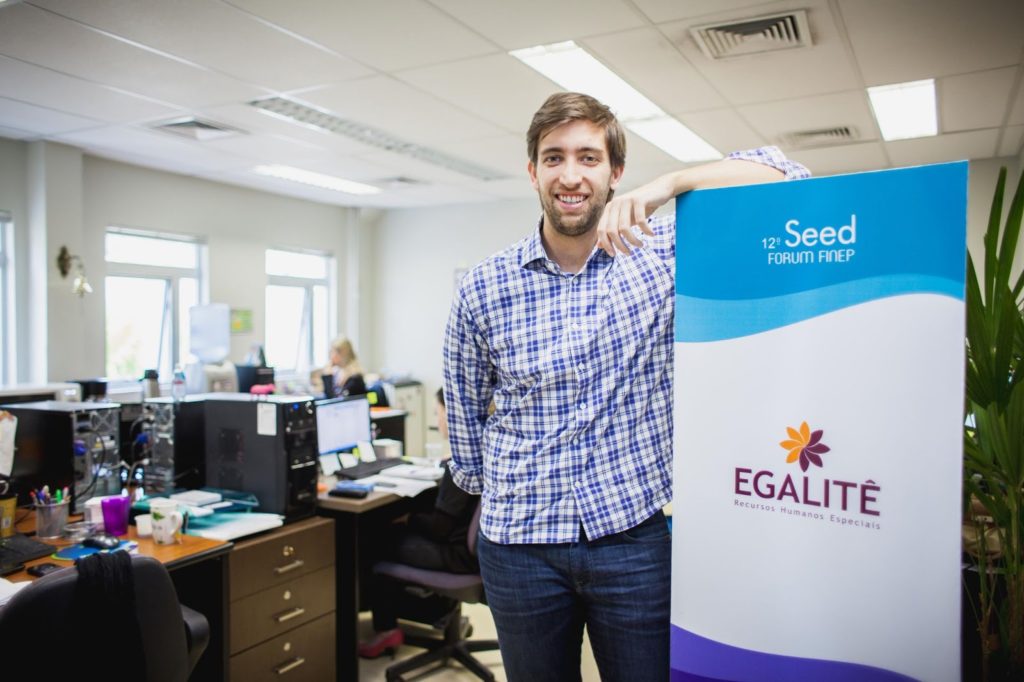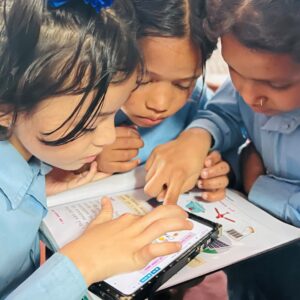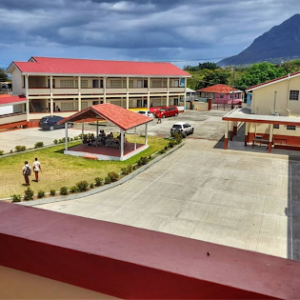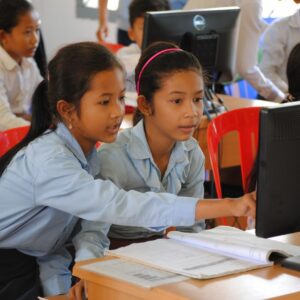Interviewed by Annalisa Crowe
We recently welcomed Guilherme Braga, CEO and co-founder of Brazil-based Egalite as a Young Leaders of the Americas Initiative fellow for entrepreneurs through the U.S. Department of State. Egalite specializes in the recruitment of persons with disabilities (PWD) and has innovation at its core. To connect companies and PWD, Egalite has developed an online recruitment platform, evaluation of behavioral profile, and e-learning education that is fully adapted for persons with disabilities. Guilherme joined the YLAI fellowship for the opportunity to connect with different companies in the U.S. and leaders in the education and technology fields.
We held a Q&A session with Guilherme to learn more about his work and experience.
Annalisa: Why did you decide to work in edtech (educational technologies) and why in recruitment of PWD in particular?
Guilherme: There were a few experiences I had in my life that took me to this path. I graduated in law so it was not the obvious choice to work with persons with disabilities (PWD), but during my education I learned there is a quota law in Brazil for companies to have 2-5% of PWD in their workforce. When I first heard about the way companies were approaching this quota law, it was not at all what I expected to hear. Most companies viewed it as a burden, rather than a benefit. It took me back to my experience with an exchange student in the United States in a small town in Michigan. I had a chance to interact with many colleagues with disabilities and it was the first time I had the opportunity to engage with PWD. I learned that Brazil’s environment seemed to have many more barriers for PWD. I felt strange because when I came back to Brazil it felt like PWD were invisible – I didn’t see them in school or work or in any professional environments. So when I had the chance to learn more about the quota law, it led me to the idea of starting a company that promotes inclusion and opportunity for the whole society, including PWD. Egalite was formed to be a great opportunity for companies to learn about inclusion and get great benefits from hiring PWD.
Annalisa: Can you tell me more about your product and how it works?
Guilherme: Our company created a recruitment platform that is fully accessible for PWD, and by doing that we were able to scale our business nationwide.
Egalite prepares, recruits, and evaluates candidates. The preparation occurs through free online courses adapted to PWD, which focus on soft skills and other basic skills, but are very important for entering the job world (e.g., how to present yourself in an interview). The evaluation takes place through a behavioral profile test. With this assessment, we can check the best job for the applicant and place them on the right job opportunity. An algorithm calculates the best opportunity for each candidate, based on geolocation, education, salary requirements, practice area, and behavioral profile. Using this technology we have been able to employ 8,000 people and have a database of over 65,000 people.
We are also expanding our work and creating a platform where companies will be able to have access to that database because we want even more impact. Currently, we are a recruitment company so it is our team at Egalite that operates the database. But eventually, we hope to offer two different options, so a company can either hire a team member from Egalite to manage the process, or the company can get access to the platform and manage the recruiting process themselves.
Annalisa: What makes your platform more accessible to PWD?
Guilherme: We have many different tools to ensure accessibility for PWD. Artificial intelligence, which is used in many other platforms, tends to use a lot of data to create their machine learning and algorithms, but if you have a minority group they are excluded and are not considered in the artificial intelligence. So all the stuff we do is focused on candidate potential and not their disability, we do not want to exclude a candidate because they have a disability. We give them a platform they can use and understand fully. For example, we have ensured that our website is able to be used with a screen reader for those who are blind. And a deaf person might not be able to fully understand by reading text, so we have videos in sign language. Our goal is to show the company that yes, as an employee they might need some accommodations, but they offer tremendous value and that is what is important.
Annalisa: What are some examples from your work that demonstrate its benefits?
Guilherme: We have a very interesting example to share about our work with Walmart in Brazil. We helped them hire over 900 persons with disabilities during an 18-month period. After we were done, they reached the legal quota and decided to analyze the results, and discovered the retention rates of PWD was 50% higher than those without a disability. Due to this positive result, Walmart decided to calculate the ROI of the project. They calculated they were saving over 10 million dollars per year by employing persons with disabilities. The CEO of Walmart in Brazil decided he did not want just 5% PWD in his company (the quota law), but wanted Walmart to have 7% because he saw that it really generated value in both social benefits and business benefits (Details).
We are also working simultaneously with McDonald’s and Burger King in Brazil. We helped McDonald’s reach the quota for the very first time, after they had been unable to do so for over 10 years. And Burger King is newer in Brazil, but they also have experienced difficulty with reaching the quota for PWD employees. Immediately after hiring us, we helped them meet the quota, employ over 400 persons with disabilities so far, and are planning to employ over 500 more PWD in the next two years!
Annalisa: What are some of your company’s goals, and what are ways companies in the U.S. can help you more meet these goals?
Guilherme: This year we are expanding outside of Brazil and starting a pilot project in Chile. Our goal is to use our technology in other countries because there are a lot of recruitment platforms, but most of them are not fully accessible and we hope that with our technology we are able to scale our impact and help other partners or companies outside of Brazil employ PWD.
Annalisa: What has been exciting about collaborating with World Education and its efforts to advance digital equity for adults in the United States?
Guilherme: We want to learn more about the potential use of our product for educational purposes and explore its potential use in adult learning and workforce development context. We have been learning more about skills-based jobs and digital navigator services through World Education. This is of great interest to us because this is something we could add to our platform. We realize the current jobs will likely drastically shift and change in the next few years, so it is important to understand what are the skills PWD have today and what are the skills they will need to develop for the future of work, and discover how we can help them develop these new skills. It was interesting to be connected with World Education because it is very important for us to include more knowledge about digital inclusion because a candidate at least needs to be able to complete our process on the website which is basic for some people, but for others without digital skills that can be very hard. We are really looking forward to finding new ways to help those who are not digitally included yet learn more skills and gain access to more opportunities through our platform.
Interested in learning more about Egalite? Connect with Guilherme on LinkedIn and at guilherme@egalite.com.br.




